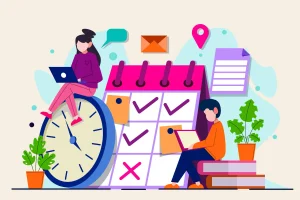How to Decide When to End Counseling and Start Maintenance
By Prapoorna M
Last Updated: June 10, 2024
Counseling plays a crucial role in nurturing and maintaining healthy relationships. Whether it’s for resolving conflicts, improving communication, or strengthening emotional bonds, counseling provides a supportive environment for couples to work through their issues. However, there comes a time when couples may wonder if they are ready to transition from regular counseling sessions to maintenance sessions.
Deciding when to end counseling and start maintenance is a significant step. It’s not just about stopping therapy but ensuring that the relationship is stable and can continue to thrive with less frequent guidance. This decision requires careful consideration and understanding of various factors.
Book Your Marriage Counselling Now
Understanding the Counseling Journey
Counseling is a journey designed to help couples navigate challenges, improve communication, and build a stronger emotional connection. The typical goals and milestones in counseling revolve around understanding and addressing the root causes of conflicts, developing effective communication strategies, and fostering a deeper emotional bond between partners.
Goals and Milestones in Counseling
- Identifying Issues: The first step in counseling is to identify the main issues affecting the relationship. This involves open discussions facilitated by the therapist, helping both partners articulate their concerns and feelings.
- Developing Communication Skills: A key milestone is learning how to communicate effectively. This includes active listening, expressing feelings without blame, and understanding each other’s perspectives.
- Resolving Conflicts: Counseling aims to equip couples with tools to resolve conflicts constructively. This means moving from confrontation to collaboration, finding mutually acceptable solutions, and managing disagreements without escalation.
- Building Emotional Intimacy: Strengthening the emotional connection is crucial. This involves sharing vulnerabilities, supporting each other’s emotional needs, and creating a safe space for open dialogue.
Role of Partners and Therapists
The success of counseling depends significantly on the active participation of both partners and the guidance of the therapist. Here’s how each role contributes:
- Partners’ Role: Both partners must be committed to the process, open to feedback, and willing to work on their issues. Active participation, honesty, and a willingness to change are essential.
- Therapist’s Role: The therapist acts as a facilitator, guiding the couple through difficult conversations, providing tools and techniques for improvement, and helping them stay focused on their goals. The therapist also monitors progress and helps the couple recognize their achievements.
Recognizing Improvements and Achieving Emotional Milestones
Recognizing when significant improvements have been made is crucial in determining readiness to transition to maintenance. Here are some signs that indicate readiness:
- Consistent Positive Communication: The couple consistently communicates in a positive, constructive manner without the therapist’s prompting.
- Effective Conflict Resolution: The couple can resolve conflicts independently, using the tools and strategies learned in counseling.
- Stable Emotional Connection: There is a noticeable improvement in the emotional bond, with both partners feeling more connected and supportive of each other.
- Reduced Dependence on Therapy: The couple feels confident in their ability to maintain their relationship without the constant need for therapy sessions.
Indicators It’s Time to Transition
Knowing when to transition from regular counseling to maintenance sessions is crucial for sustaining a healthy and happy relationship. Here are key indicators that suggest you might be ready for this transition:
Improved Communication
One of the primary goals of counseling is to enhance communication between partners. Consistent, healthy communication is a strong signal that you might be ready to move to maintenance sessions. This means:
- Open and Honest Dialogues: Both partners feel comfortable expressing their thoughts and feelings without fear of judgment or conflict.
- Active Listening: Each partner listens attentively, acknowledges the other’s perspective, and responds thoughtfully.
- Non-Defensive Responses: Discussions are free from defensive reactions, and partners are more receptive to feedback.
Conflict Resolution Skills
Another critical indicator is the ability to resolve conflicts effectively without the therapist’s intervention. This includes:
- Calm Discussions: Partners can discuss disagreements calmly and rationally, focusing on finding solutions rather than placing blame.
- Problem-Solving Abilities: The couple can identify the root causes of conflicts and work together to resolve them.
- Mutual Respect: Even during disagreements, there is a foundation of mutual respect and understanding.
Emotional Stability
Maintaining emotional stability and intimacy is essential for a healthy relationship. Signs of emotional stability include:
- Consistent Emotional Support: Partners provide consistent emotional support to each other, fostering a secure and loving environment.
- Reduced Anxiety and Stress: The couple experiences less anxiety and stress in their interactions, indicating a stable emotional bond.
- Intimate Connection: There is a sustained intimate connection, with both partners feeling valued and understood.
Also Read: Lack of Sexual intimacy in Relationships
Avoiding Premature Ending
Deciding when to end counseling and transition to maintenance is a delicate process. Ending counseling too early can lead to unresolved issues resurfacing and undoing the progress made. Here’s why it’s important to avoid premature endings and ensure continuity in your relationship journey.
Potential Pitfalls
Ending counseling prematurely can pose significant risks, such as:
- Unresolved Issues: Issues that seem resolved on the surface may not be fully addressed. These can resurface during stressful times, leading to conflicts.
- Relapse into Old Patterns: Without sufficient time to internalize new behaviors, couples may revert to old, unproductive patterns of interaction.
- False Sense of Security: Couples might feel a false sense of security, thinking they have resolved their issues, only to find themselves struggling without the structured support of counseling.
Importance of Continuity
Continuity is crucial for maintaining the progress achieved during counseling. Here’s why:
- Reinforcing New Habits: Consistent counseling sessions help reinforce new communication and conflict resolution habits. This repetition ensures these new behaviors become ingrained.
- Building Confidence: Continued counseling allows couples to build confidence in their ability to manage their relationship independently. This confidence is key to sustaining long-term improvements.
- Ongoing Support: Regular sessions provide ongoing support to navigate new challenges as they arise, ensuring that couples remain on track.
Therapist’s Advice
The therapist’s perspective is invaluable when deciding to end counseling. Therapists can provide objective insights based on their observations and professional experience:
- Professional Assessment: Therapists can assess whether the couple has reached the necessary milestones and developed the skills needed to sustain their relationship without regular sessions.
- Guided Transition: Therapists can guide the couple through the transition process, recommending a gradual reduction in session frequency rather than an abrupt end.
- Customized Advice: Each relationship is unique, and therapists can offer tailored advice on whether it’s the right time to end counseling and how to maintain progress post-counseling.
Potential Pitfalls and Solutions
| Potential Pitfall | Solution |
|---|---|
| Unresolved Issues | Ensure Continuity: Make sure all significant issues are thoroughly addressed before ending counseling. Discuss any lingering concerns with your therapist and partner. Use the final sessions to solidify your understanding and approaches to handling these issues. |
| Relapse into Old Patterns | Regular Check-ins: Schedule regular maintenance sessions and practice self-monitoring to identify and correct old patterns as they emerge. These check-ins help maintain progress and address any small issues before they become significant problems. Maintain open communication with your partner to ensure that both of you are aware of and can address any re-emerging issues. |
| False Sense of Security | Gradual Reduction: Reduce the frequency of sessions gradually and rely on your therapist’s guidance to ensure you are truly ready to end regular counseling. This gradual reduction helps you and your partner adjust to the new dynamic and ensures that the support system remains in place until both partners are confident in their ability to maintain the relationship independently. Discuss your progress and any concerns with your therapist during this transition period. |
Steps to Transition from Counseling to Maintenance
Successfully transitioning from regular counseling to maintenance sessions involves a few strategic steps. These steps ensure that the progress made during counseling is maintained and that the relationship continues to thrive. Here’s how you can navigate this transition smoothly:
Gradual Reduction
Abruptly stopping counseling can be jarring and might undo some of the progress made. Instead, consider gradually reducing the frequency of your sessions. Here’s how to do it:
- Step Down Slowly: Start by moving from weekly to bi-weekly sessions, then to monthly sessions, as you feel more confident in managing your relationship independently.
- Monitor Progress: During this period, keep track of your interactions and any challenges that arise. Discuss these in your sessions to ensure you’re on the right track.
- Adjust as Needed: If any significant issues come up, don’t hesitate to increase the frequency temporarily to address them effectively.
Regular Check-ins
Even after transitioning to maintenance sessions, it’s important to have periodic check-ins to ensure ongoing progress. Here’s why regular check-ins are beneficial:
- Consistent Support: Regular maintenance sessions provide a consistent support system to help navigate new challenges as they arise.
- Preventive Measure: These check-ins act as a preventive measure, allowing you to address any potential issues before they escalate.
- Reinforce Skills: They offer an opportunity to reinforce the skills and strategies learned during counseling, ensuring they become a permanent part of your relationship toolkit.
Self-Monitoring
Self-monitoring is a proactive approach to maintaining the health of your relationship. Here’s how you can effectively self-monitor:
- Regular Self-Assessments: Periodically assess your relationship by asking yourself key questions about communication, conflict resolution, and emotional connection. Tools like relationship quizzes or self-assessment checklists can be helpful.
- Open Dialogue: Maintain an open dialogue with your partner about your relationship. Discuss any concerns or areas that need improvement openly and honestly.
- Early Intervention: If you notice any signs of old patterns re-emerging or new issues developing, address them early. Don’t wait until they become significant problems.
Benefits of Maintenance Sessions
Maintenance sessions play a crucial role in sustaining the progress made during counseling and ensuring the long-term health of your relationship. Here are the key benefits of continuing with maintenance sessions:
Continued Support
Maintenance sessions provide ongoing support, helping couples stay on track and prevent relapse into old, unproductive patterns. Here’s how:
- Reinforcement of Skills: Regular check-ins reinforce the communication and conflict resolution skills learned during counseling. This continual reinforcement ensures that these skills become second nature.
- Guidance and Feedback: Maintenance sessions offer a platform to discuss any new challenges with your therapist and receive guidance and feedback. This ongoing support helps you navigate any issues effectively.
- Accountability: Knowing that you have periodic sessions can motivate both partners to stay committed to positive changes and work continuously on their relationship.
Preventative Care
Just like regular health check-ups, maintenance sessions act as preventative care for your relationship. Here’s why they are essential:
- Early Detection: Maintenance sessions allow for the early detection of potential issues before they escalate into significant problems. Addressing these issues early can prevent misunderstandings and conflicts from worsening.
- Proactive Approach: These sessions encourage a proactive approach to relationship health, where couples can discuss and resolve minor issues before they become major concerns.
- Continual Improvement: Maintenance sessions provide opportunities for continual improvement, helping couples refine their interactions and deepen their connection over time.
Strengthening Bonds
Regular maintenance sessions can further strengthen the emotional and relational bonds between partners. Here’s how they contribute to a stronger relationship:
- Deepened Connection: Maintenance sessions provide a dedicated space for couples to connect on a deeper level, discussing their feelings and experiences openly and honestly.
- Renewed Intimacy: By regularly focusing on the relationship, couples can renew and sustain their intimacy, ensuring that their bond remains strong and vibrant.
- Shared Goals: Maintenance sessions help couples set and work towards shared goals, fostering a sense of teamwork and mutual support.
Strengthening bonds through maintenance sessions helps couples maintain a healthy, loving, and supportive relationship in the long term.
How to Effectively Use Maintenance Sessions
Maintenance sessions are a powerful tool to keep your relationship strong and thriving. To get the most out of these sessions, it’s important to approach them with clear goals, open communication, and flexibility. Here’s how you can effectively use maintenance sessions:
Setting Goals
Setting realistic goals is crucial for making maintenance sessions productive and focused. Here’s how to do it:
- Identify Areas of Improvement: Discuss with your partner the areas you both feel need attention. This could be communication, conflict resolution, or emotional intimacy.
- Set Specific Goals: Rather than vague objectives, set specific, measurable goals. For example, aim to improve communication by practicing active listening during disagreements.
- Review Progress: Regularly review your progress towards these goals. Celebrate successes and identify any obstacles that need addressing.
Open Communication
Open, honest communication is the backbone of any healthy relationship and is especially important during maintenance sessions. Here’s why:
- Build Trust: Honest communication builds trust between partners. Use these sessions to express your feelings, concerns, and appreciation openly.
- Address Issues Early: Discuss any issues or concerns as they arise rather than letting them fester. This proactive approach helps prevent minor problems from escalating.
- Seek Clarity: If anything is unclear or troubling, ask for clarification. Misunderstandings can be resolved quickly when addressed directly.
Flexibility
Flexibility in scheduling and conducting maintenance sessions is key to their effectiveness. Here’s how to maintain flexibility:
- Adapt to Needs: Life is dynamic, and so are relationships. Be willing to adjust the frequency and focus of your sessions based on your current needs and circumstances.
- Be Open to Change: If a particular approach isn’t working, be open to trying new strategies or techniques suggested by your therapist.
- Schedule Conveniently: Ensure that sessions are scheduled at times that are convenient for both partners. This reduces stress and makes it more likely that you will both be fully present and engaged.
When to Consider Returning to Regular Counseling
While maintenance sessions can be highly effective in sustaining the progress made during regular counseling, there are times when returning to regular counseling might be necessary. Here are some scenarios to consider:
New Challenges
Life is full of changes and new challenges, which can put a strain on even the strongest relationships. Here’s when you might need to return to regular counseling:
- Major Life Events: Events such as having a baby, moving to a new city, or significant job changes can introduce new stressors. These changes might bring up issues that require more intensive support to navigate.
- Adjusting to New Roles: Transitions such as becoming new parents or starting a new career can change the dynamics of your relationship. Regular counseling can help you adjust to these new roles and responsibilities.
- Unexpected Stressors: Unforeseen circumstances like a serious illness, financial difficulties, or the loss of a loved one can also necessitate a return to regular counseling to provide the necessary support and coping strategies.
Recurring Issues
Addressing recurring issues promptly is essential to prevent them from undermining the progress you’ve made. Here’s why this might require a return to regular counseling:
- Patterns Resurfacing: If you notice that old patterns of conflict or communication issues are re-emerging, it’s a sign that you might need additional support to address these effectively.
- Unresolved Conflicts: Persistent conflicts that remain unresolved despite your best efforts can be damaging. Regular counseling sessions can provide the space to work through these deeper issues.
- Emotional Distance: If you or your partner are feeling emotionally distant or disconnected, returning to regular counseling can help rebuild emotional intimacy and trust.
Therapist’s Recommendation
Your therapist’s recommendation is a valuable resource in deciding whether to resume regular counseling sessions. Here’s why you should consider their advice:
- Objective Perspective: Therapists provide an objective perspective on your relationship’s health and can identify issues that you might not see.
- Professional Assessment: Based on their experience and assessment, therapists can recommend additional support when needed, ensuring that your relationship continues to grow positively.
- Tailored Guidance: Therapists can offer personalized guidance on how to navigate specific challenges, making their recommendations highly relevant to your unique situation.
Indicators for Returning to Regular Counseling
| Indicator | Description |
|---|---|
| New Challenges | Major life events such as having a baby, moving to a new city, or significant job changes introduce new stressors and dynamics into the relationship. These events can create unforeseen challenges requiring additional support to navigate successfully. Returning to regular counseling during these times can provide the tools and strategies to effectively manage these changes. |
| Recurring Issues | Major life events such as having a baby, moving to a new city, or significant job changes introduce new stressors and dynamics into the relationship. These events can create unforeseen challenges requiring additional support to navigate successfully. Returning to regular counseling during these times can provide the tools and strategies to manage these changes effectively. |
| Therapist’s Recommendation | Based on their professional assessment, a therapist may advise returning to regular counseling sessions if they observe that the couple is struggling to maintain progress or if new challenges are affecting the relationship. Their objective perspective and expertise can provide valuable guidance on when additional support is needed. Trusting the therapist’s recommendation can ensure that the couple receives the appropriate level of support to strengthen their relationship. |
Conclusion
Deciding when to end counseling and move to maintenance sessions is an important step. It’s about knowing when you’re ready by looking at how well you communicate, resolve conflicts, and maintain emotional stability. Don’t rush to end counseling too soon, as old issues can come back. Follow the steps to transition gradually, keep up with regular check-ins, and monitor your relationship to make sure you stay on track. Maintenance sessions help by offering continued support, catching potential issues early, and strengthening your bond. Setting goals, communicating openly, and being flexible with your sessions will keep your relationship healthy.
Being proactive about your relationship is key. Regularly assess how things are going, set goals together, and keep talking to each other. At Wellness Hub, we provide resources and support for every stage of your counseling journey. Whether you’re just starting, in the middle of counseling, or moving to maintenance, we’re here to help. Visit our website to find more tools and guidance to support your relationship.
Frequently Asked Questions:
1. How do you know when to end counseling and start maintenance?
Knowing when to end counseling and transition to maintenance involves assessing consistent, healthy communication, effective conflict resolution, and emotional stability. If you and your partner can handle issues independently, it might be time to transition.
2. What are the benefits of maintenance counseling sessions?
Maintenance sessions provide continued support, help prevent relapse into old patterns, and strengthen emotional bonds. They also allow for early detection of potential issues, ensuring your relationship stays on track.
3. What steps should we take to transition from regular counseling to maintenance?
To transition effectively, gradually reduce the frequency of sessions, schedule regular check-ins, and practice self-monitoring. These steps help maintain progress and address any issues early.
4. When should couples consider returning to regular counseling?
Couples should consider returning to regular counseling during major life changes, such as having a baby or job changes, when recurring issues resurface, or if their therapist recommends it.
5. Why is it important to avoid ending counseling too early?
Ending counseling too early can lead to unresolved issues resurfacing and a relapse into old patterns. Ensuring continuity in counseling helps reinforce new habits and maintains the progress made.
6. How can we make the most out of maintenance sessions?
Set realistic goals, maintain open and honest communication, and be flexible with scheduling. These practices ensure maintenance sessions are effective and beneficial for your relationship.
7. What role does a therapist play in the transition to maintenance sessions?
A therapist provides professional assessment, guides the transition process, and offers tailored advice. Their objective perspective ensures that the decision to end counseling is well-informed.
8. How can Wellness Hub support our counseling journey?
Wellness Hub offers resources and support for couples at every stage of their counseling journey, from initial sessions to maintenance. Visit our website to explore tools and guidance tailored to your needs.
About the Author:
Prapoorna Mangalampalli
M.Sc., M.A., (Dual Masters in Psychology & English) – Counselor (6+ years of experience)
Prapoorna, with dual Master’s degrees in Psychology and English and over 6 years of experience, elevates human experiences through insightful counseling. She excels in online, marital, relationship, child, family, and career counseling. At Wellness Hub, she thrives in a team environment, valuing innovation, compassion, and client success.
Connect with Prapoorna to find your voice and build a brighter future.
Book your Free Consultation Today
Parent/Caregiver Info:
Client’s Details:
* Error Message









